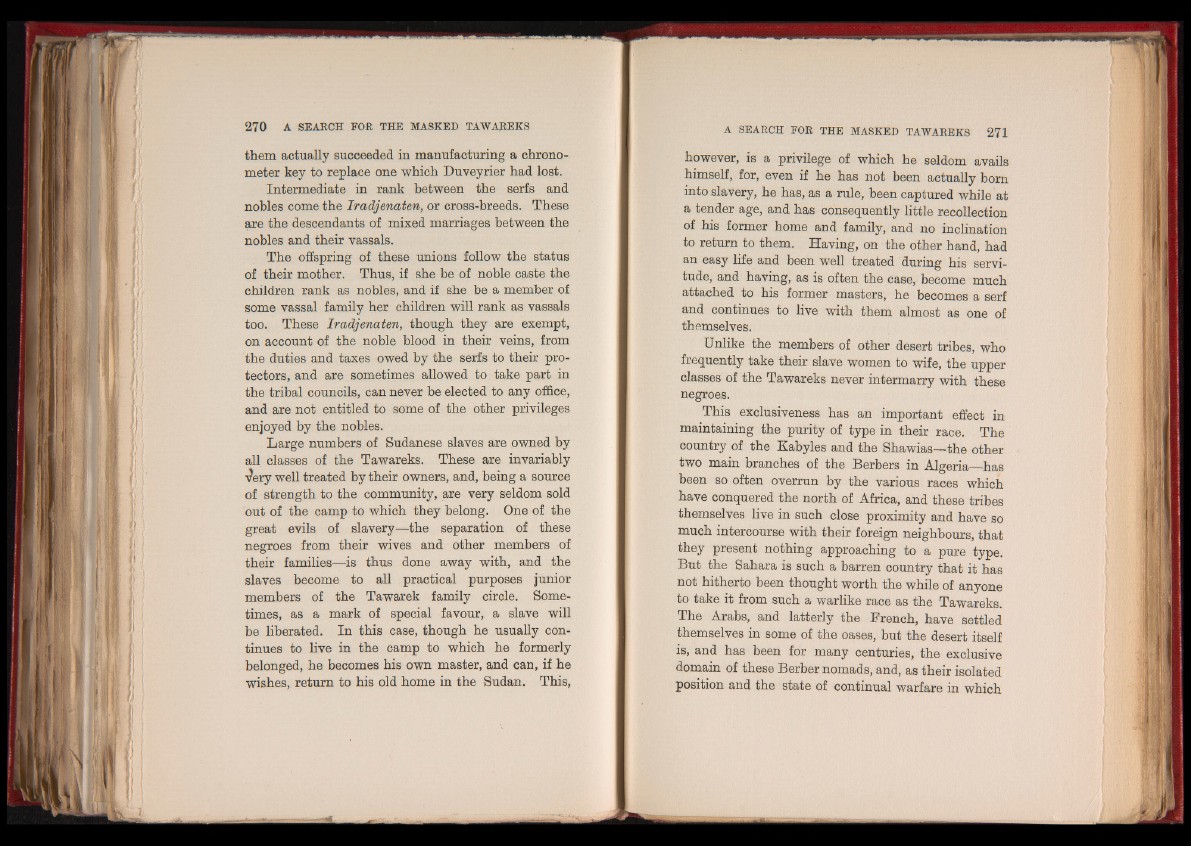
them actually succeeded in manufacturing a chronometer
key to replace one which Duveyrier had lost.
Intermediate in rank between the serfs and
nobles come the Iradjenaten, or cross-breeds. These
are the descendants of mixed marriages between the
nobles and their vassals.
The offspring of these unions follow the status
of their mother. Thus, if she be of noble caste the
children rank as nobles, and if she be a member of
some vassal family her children will rank as vassals
too. These Iradjenaten, though they are exempt,
on account of the noble blood in their veins, from
the duties and taxes owed by the serfs to their protectors,
and are sometimes allowed to take part in
the tribal councils, can never be elected to any office,
and are not entitled to some of the other privileges
enjoyed by the nobles.
Large numbers of Sudanese slaves are owned by
all classes of the Tawareks. These are invariably
-\?ery well treated by their owners, and, being a source
of strength to the community, are very seldom sold
out of the camp to which they belong. One of the
great evils of slavery—the separation of these
negroes from their wives and other members of
their families—is thus done away with, and the
slaves become to all practical purposes junior
members of the Tawarek family circle. Sometimes,
as a mark of special favour, a slave will
be liberated. In this case, though he usually continues
to live in the camp to which he formerly
belonged, he becomes his own master, and can, if he
wishes, return to his old home in the Sudan. This,
however, is a privilege of which he seldom avails
himself, for, even if he has not been actually born
into slavery, he has, as a rule, been captured while at
a tender age, and has consequently little recollection
of his former home and family, and no inclination
to return to them. Having, on the other hand, had
an easy life and been well treated during his servitude,
and having, as is often the case, become much
attached to his former masters, he becomes a serf
and continues to live with them almost as one of
themselves.
Unlike the members of other desert tribes, who
frequently take their slave women to wife, the upper
classes of the Tawareks never intermarry with these
negroes.
This exclusiveness has an important effect in
maintaining the purity of type in their race. The
country of the Kabyles and the Shawias—the other
two main branches of the Berbers in Algeria—has
been so often overrun by the various races which
have conquered the north of Africa, and these tribes
themselves live in such close proximity and have so
much intercourse with their foreign neighbours, that
they present nothing approaching to a pure type.
But the Sahara is such a barren country that it has
not hitherto been thought worth the while of anyone
to take it from such a warlike race as the Tawareks.
The Arabs, and latterly the French, have settled
themselves in some of the oases, but the desert itself
is, and has been for many centuries, the exclusive
domain of these Berber nomads, and, as their isolated
position and the state of continual warfare in which